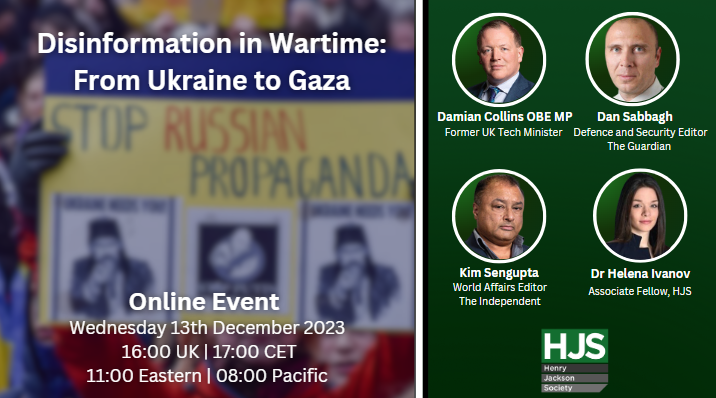Disinformation in Wartime: From Ukraine to Gaza

- This event has passed.
Disinformation in Wartime: From Ukraine to Gaza
13th December 2023 @ 4:00 pm - 5:00 pm

For years, misinformation and disinformation have posed a significant threat, with war situations exposing their life-and-death consequences. The recent Israel conflict exemplifies this danger.
What strategies do journalists and editors employ to guarantee the accuracy of their content? In the midst of direct reporting from war zones, how do war correspondents validate the information they receive? Furthermore, how do social media platforms like Twitter and other Meta-owned platforms safeguard the sharing of accurate and trustworthy sources and information, and what mechanisms are in place to combat the dissemination of disinformation and misinformation.
The Henry Jackson Society is delighted to welcome the distinguished experts in examining the disinformation threat in modern-day warfare.

This photo is a property of https://damiancollins.com/
Damian Collins is the Conservative MP for Folkestone and Hythe, first elected in 2010. Damian was Parliamentary Under Secretary of State at the Department for Digital, Culture, Media and Sport, serving as Minister for Tech and the Digital Economy in 2022. In 2021, Damian chaired a Joint Committee of the House of Lords and House of Commons scrutinising the draft Online Safety Bill. From 2016 to 2019, Damian chaired the House of Commons Digital, Culture, Media and Sport Select Committee, leading inquiries into Disinformation and ‘Fake News’, Immersive and Addictive Technologies, Homophobia in Sport, Football Governance, Reality TV, and the BBC. During this time, he co-founded the International Grand Committee, a group of parliamentarians from around the world working together on electoral communications, disinformation, data privacy and digital competition. Prior to being an MP, Damian worked in the advertising industry for M&C Saatchi and Lexington Communications.

Dan Sabbagh is defence and security editor at the Guardian, and specialises in warfare, terrorism and espionage.

Kim Sengupta is the World Affairs Editor of The Independent in London.He has reported on major international events, including conflicts, from Syria, Afghanistan, Iraq, Libya, Somalia, Darfur, Egypt, Israel/Palestine, Kashmir, Sri Lanka, Iran, Turkey, the Balkans, Georgia, Ukraine, Georgia, US, Canada, most of Europe, Argentina, Brazil, Sierra Leone, Mali, India, Japan, Nepal, Singapore, Tunisia, South Africa, Russia, Zambia, Zimbabwe. In that time Kim has either won or has been a finalist in 15 journalistic awards.
Kim’s latest assignment has been to Israel covering the Hamas massacre and its aftermath. He has been to the West Bank to write on the clashes between the Palestinians and Israeli security forces and settlers and meet Palestinian militants including Hamas and Islamic Jihad supporters. He also reported from the Lebanese border where artillery duels and skirmishes are taking place between Hezbollah and the Israelis. The last four Gaza wars were covered by Kim from inside Gaza, the option to do so is not available for the time being.
Before Israel Kim has been in Ukraine which he had covered since the Maidan protests and from Crimea when the Russia occupied and annexed the territory and from Donbas and Luhansk from the start of the separatist war. Kim stayed in Kyiv during the Russian invasion and subsequently reported from Kharkiv when it was under attack and then across Ukraine covering battles Lysychansk in Severodonetsk and Bakhmut as well as Zaporizhia and Kherson. He has also reported on war crimes committed by the Russians in Bucha and other places and has given information on that to human rights organisations.
Kim has taken part in a series of conflict resolution conferences. He also appears on forums for the media, diplomats and politicians, armed force and security officials.

Dr Helena Ivanov is an associate research fellow at the Henry Jackson Society. She recently completed a PhD in International Relations at the London School of Economics and Political Science. Her research focuses on the relationship between propaganda and violence against civilians. In her thesis, Helena examined the role propaganda played during the Yugoslav Wars and produced a model for studying propaganda which details the key phases, functions, discourses, and techniques of propaganda (the model itself is applicable to other contexts). Additionally, Helena also served as a Manager at the Centre for International Studies at the LSE.
Prior to her PhD, Helena completed an MPhil in Political Theory at the University of Oxford, and holds a BA in Politics from the University of Belgrade.
***
EVENT SUMMARY
The Henry Jackson Society was pleased to host an event with Kim Sengupta, Damian Collins OBE MP, and Dan Sabbagh chaired by Dr. Helena Ivanov. Dan Sabbagh started off by asserting that there was limited purposeful disinformation propagated on a journalistic level; journalists are not easily persuaded by fake or deceitful information. However, he pointed out that there is a demi monde of the internet where non credible or uninformed users spread information on online platforms, especially those that do not facilitate content moderation. Kim Sengupta follows with an analysis of current conflicts, particularly the Israel-Hamas war, where he notes a difficulty in covering the conflict due to intensity of the discussion on social media platforms resulting in all journalistic reporting to be heavily scrutinized. He pointed out OSINT and other effort to decipher what the underlying truth behind the various stories is, but, ultimately underlined that the lack of on sight journalists in Gaza (as well as on the Russian front in Ukraine) make the reporters reliant on reporting from locals. Damian Collins made the point that disinformation often did not serve to persuade the audience of a specific matter, but rather cloud their trust in established media outlets. He touched on the regulations UK has instituted, specifically targeting disinformation spread by a hostile foreign state. The speakers then tackled questions regarding the race to break news, younger audience seeking new on alternative platforms and deep fakes.
RELATED EVENTS
British General Election Campaigns 1830-2019: Can The Past Inform The Future?”
The British general election is the linchpin of our liberal democracy, and its results are often fundamental to how we live. With the next UK general election looming, there is therefore … Continued



